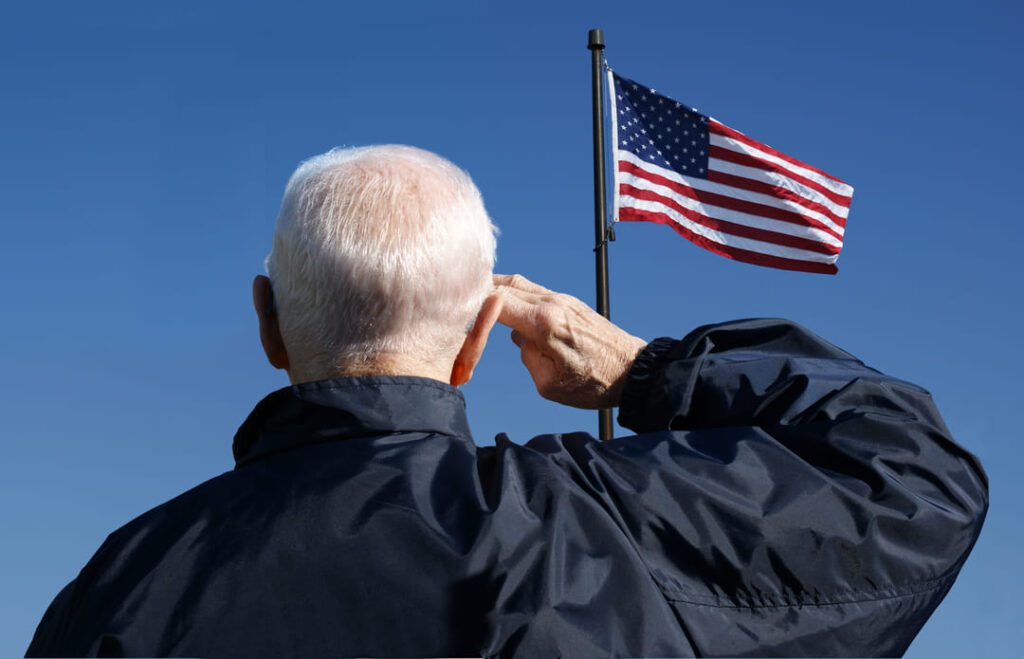Looking for Expert-Level VA Claim Answers?📱Call Us Now! 737-295-2226
Blue Water Navy Vietnam Veterans Act Extends Disability Benefits
If you’re a Blue Water Vietnam veteran, your path for filing and winning a VA claim for Agent Orange-linked illnesses is now much easier, thanks to the Blue Water Navy Vietnam Veterans Act of 2019.
Before 2020, it was much more difficult for Navy veterans to get the disability benefits they rightfully earned for herbicide exposure and Agent Orange conditions. Navy Vietnam veterans who served within 12 nautical miles off the shore of Vietnam were often denied disability claims compared to veterans who deployed on the ground in Vietnam—even if they had the exact same condition and diagnosis.
Upwards of 90,000 veterans served on ships in Vietnam’s territorial waters during the war. These ships rarely docked in Vietnamese ports. Yet, these veterans were often exposed to the same harmful effects of Agent Orange and later developed severe medical conditions due to their exposure.

Now, the VA grants Navy Vietnam veterans the same presumptive service connection for the 17 conditions linked to Agent Orange exposure.
The Blue Water Navy Vietnam Veterans Act means two things for you:
- If you haven’t yet filed a claim for an Agent Orange-related disability as a Blue Water Navy veteran, the process will be much simpler.
- If your VA claim for an illness linked to Agent Orange exposure was previously denied, you should apply again (especially if you were denied before 2019).
Keep reading to learn more about filing a VA claim for benefits for Blue Water veterans benefits!
- Blue Water Navy Vietnam Veterans Act Extends Disability Benefits
- Who is a Blue Water Navy Vietnam veteran?
- How can I prove I’m a Blue Water Navy veteran?
- What Navy and Coast Guard ships qualify for Agent Orange connection?
- What is a Blue Water Navy Claim?
- What health issues are Blue Water Navy veterans experiencing?
- If my Blue Water Navy Agent Orange claim was previously denied, how do I file again?
- What if I’m the surviving spouse of a Blue Water Navy veteran?
- Will the VA award me back pay if my new claim is approved?
- What if my condition isn’t on the Agent Orange presumptive list?
- Get help with your claim—and the compensation you deserve.
- About the Author
You DESERVE a HIGHER VA rating.
Take advantage of a VA Claim Discovery Call with an experienced Team Member. Learn what you’ve been missing so you can FINALLY get the disability rating and compensation you’ve earned for your service.
Who is a Blue Water Navy Vietnam veteran?
If you served on a Navy or Coast Guard vessel during Vietnam and never went ashore, you’re likely considered a Blue Water Navy Vietnam veteran.
You must have served in the offshore waters of Vietnam anytime between January 9, 1962, to May 7, 1975. “Offshore waters” are considered within 12 nautical miles off the coast of Vietnam.
How can I prove I’m a Blue Water Navy veteran?
You may know that you meet the above requirements and are a Blue Water veteran, but the VA will require proof when filing your disability claim.
If you served onboard a Navy or Coast Guard vessel during Vietnam, you should include a few specific details to prove your service in Vietnam’s territorial waters:
- The name of the ship you served on.
- The date you crossed within 12 nautical miles of Vietnam.
What Navy and Coast Guard ships qualify for Agent Orange connection?
Before the 2019 update, Navy Veterans had to provide evidence they went ashore to receive presumptive service connection for any illnesses they filed a claim for related to herbicide exposure. To help with this, the VA maintained a ship list of all ships known to operate in close coastal waters that delivered supplies or troops ashore, had crew members go ashore, or operated temporarily on Vietnam’s inland waterways.
The VA no longer requires you to provide evidence you went ashore.

We know how difficult it can be to remember or find out the date you first sailed within 12 nautical miles of Vietnam. There are a few tools you can use to search for this info.
You can check whether the vessel you served on is already on the VA’s ship list. Providing records of your service onboard any vessel on the VA’s ship list will prove you’re a Blue Water Vietnam veteran.
The ship list only contains vessels that operated within inland waterways or sent sailors to shore in Vietnam. If your vessel isn’t on this list but you operated within 12 nautical miles of Vietnam, you can use the National Archives and Records Administration (NARA).
NARA has digitized Navy and Coast Guard logs for ships with Vietnam service. You can find these Navy deck logs in the National Archives Catalog.
What is a Blue Water Navy Claim?
Blue Water Navy Vietnam veterans were exposed to various different harmful chemicals. Many of these were dangerous herbicides, the most famous being Agent Orange.
Agent Orange is a dangerous herbicide used during Vietnam to deforest the dense jungle to make it harder for the enemy to hide and grow crops.
Resulting from the Blue Water Navy Vietnam Veterans Act, a Blue Water Navy claim seeks VA health care and compensation for diseases and conditions resulting from exposure to Agent Orange during Vietnam. Below we discuss the illnesses and conditions impacting Blue Water Vietnam veterans.
What health issues are Blue Water Navy veterans experiencing?
There is a list of 17 conditions already presumed by the VA to be associated with exposure to Agent Orange as a result of service in Vietnam. (This is called presumptive service connection—you can read much more about it in our complete guide: Vietnam Veterans: Is Your Medical Condition on the Agent Orange Presumptive List? ) The Blue Water Navy Vietnam Veterans Act makes qualified Navy veterans eligible for presumptive service connection for these conditions.
These 17 conditions include:
- AL Amyloidosis – A rare disease caused when an abnormal protein, amyloid, enters tissues or organs.
- Chronic B-cell Leukemias – A type of cancer that affects white blood cells.
- Type 2 Diabetes – A disease characterized by high blood sugar levels resulting from the body’s inability to respond appropriately to the hormone insulin
- Hodgkin’s Disease – A malignant lymphoma (cancer) characterized by progressive enlargement of the lymph nodes, liver, and spleen and by progressive anemia.
- Ischemic Heart Disease – A disease characterized by a reduced supply of blood to the heart, which leads to chest pain.
- Multiple Myeloma – A cancer of plasma cells, a type of white blood cell in bone marrow.
- Non-Hodgkin’s Lymphoma – A group of cancers that affect the lymph glands and other lymphatic tissue.
- Parkinson’s Disease – A progressive disorder of the nervous system that affects muscle movement.
- Parkinsonism – Any condition that causes abnormal (stiff or slow) muscle movements, trouble speaking, or tremors.
- Prostate Cancer – Cancer of the prostate, one of the most common cancers among men.
- Respiratory Cancers (includes lung cancer) – Cancers of the lung, larynx, trachea, and bronchus.
- Soft Tissue Sarcomas (other than osteosarcoma, chondrosarcoma, Kaposi’s sarcoma, or mesothelioma) – A group of different types of cancers in body tissues such as muscle, fat, blood and lymph vessels, and connective tissues.
- Bladder Cancer – A type of cancer that affects the bladder.
- Hypothyroidism – A condition that causes the thyroid gland to produce too little of key thyroid hormones, which regulate critical metabolic processes.
- Acute and Subacute Peripheral Neuropathy – A nervous system condition that causes numbness, tingling, and motor weakness. Under VA’s rating regulations, this one must be at least 10 percent disabling within one year of herbicide exposure.
- Chloracne (or other similar acneform diseases) – A skin condition that occurs soon after exposure to chemicals and looks like common forms of acne seen in teenagers. Under VA’s rating regulations, it must be at least 10 percent disabling within one year of exposure to herbicides.
- Porphyria Cutanea Tarda – A disorder characterized by liver dysfunction and thinning and blistering the skin in sun-exposed areas. Under VA’s rating regulations, it must be at least 10 percent disabling within one year of exposure to herbicides.
These last three conditions listed above are included only IF they become at least 10 percent debilitating within one year of exposure.
A Blue Water Navy veteran with one (or more) of the conditions listed above should be awarded service connection on a presumptive basis as long as they meet the other requirements for a disability claim. (You won’t have to prove a nexus when filing your claim, but you’ll still have to prove a current diagnosis and the in-service event or injury.)
Benefits may also extend to children with spina bifida whose Blue Water Navy veteran parent may have been exposed while serving.
If my Blue Water Navy Agent Orange claim was previously denied, how do I file again?
If you served in Vietnam’s territorial waters between 1962 and 1975 and have a medical diagnosis of one of the 17 illnesses listed above, you may be eligible to refile.
To be eligible, the VA must have denied your initial claim by determining that your disability wasn’t caused—or made worse—by your active-duty service. This is due to the lack of presumptive service connection before the 2019 Blue Water Navy Vietnam Veterans Act.
To file again, you should file a supplemental claim (if you filed and were denied before January 1, 2020) since the law changed in 2019. You can use VA Form 20-0995 to file again. Including the dates your vessel traveled within the offshore waters of Vietnam, or updated medical information, will help your claim.
The VA automatically reviews claims under appeal for veterans who served offshore in Vietnam. The VA has over 60,000 denied claims they’re currently working to review. The VA is also sending letters to Blue Water Veterans who were previously denied, inviting them to file again.
What if I’m the surviving spouse of a Blue Water Navy veteran?
Survivors of deceased veterans who would have been eligible to file (or file again) can also apply for benefits. Spouses who file and are approved may be awarded Dependency and Indemnity Compensation (DIC) by the VA.

Will the VA award me back pay if my new claim is approved?
Retroactive pay for Blue Water veterans depends on the type of claim you file. If this is the first time you’re filing, you’ll likely receive back pay to the first day you filed. If you’re filing again, you could receive back pay to the start of the Blue Water Navy Vietnam Veterans Act, which took effect January 1, 2020. The VA will determine your effective date on a case-by-case basis.
What if my condition isn’t on the Agent Orange presumptive list?
If you’re suffering from a condition that you believe is linked to Agent Orange but isn’t on the presumptive list, you still may be able to receive compensation for your disability—it just won’t be presumed service-connected if it’s not on the list. You’ll have to prove service connection, as with a standard claim.
To establish a service connection for your disability without the presumption, you would need to include in your claim ALL of the following:
- Evidence of diagnosis of a condition considered disabling by the VA.
- Evidence of exposure to Agent Orange.
- Evidence of a link between Agent Orange exposure and the medical condition being claimed.
You’ll need to prove a medical nexus with an independent medical opinion (IMO) that links your service to your disability. You’ll also need to provide evidence suggesting a link between the health condition and Agent Orange, if that condition is not on the presumptive list. You may be able to find scientific or medical evidence that connects your illness to Agent Orange. Medical journals and published research studies are good places to begin your research.
If you think you may be experiencing health conditions linked to Agent Orange exposure but don’t yet have a medical diagnosis, you can call the VA Environmental Health Coordinator nearest you and make an appointment to get an Agent Orange exam.
For lots more information of Agent Orange and Agent Orange claims, see our complete guide to Agent Orange Presumptives: Vietnam Veterans: Is Your Medical Condition on the Agent Orange Presumptive List?
Get help with your claim—and the compensation you deserve.
Regardless of whether or not you qualify for a Blue Water Navy Veteran Vietnam presumptive claim, it’s important to pursue monthly compensation and benefits for any disabilities connected to your military service. AND WE CAN HELP..
Most veterans are underrated for their disabilities and therefore not getting the compensation they’re due. At VA Claims Insider, we help you understand and take control of the claims process, so you can get the rating and compensation you’re owed by law.
Our process takes the guesswork out of filing a VA disability claim and supports you every step of the way in building a fully-developed claim (FDC)—so you can increase your rating fast!
If you’ve filed your VA disability claim and have been denied or have received a low rating—or you’re unsure how to get started—reach out to us! Take advantage of a FREE VA Claim Discovery Call. Learn what you’ve been missing—so you can FINALLY get the disability rating and compensation you deserve!
We’ve supported more than 15,000 veterans to win their claims and increase their ratings. NOW IT’S YOUR TURN.
About the Author

About VA Claims Insider
VA Claims Insider is an education-based coaching/consulting company. We’re here for disabled veterans exploring eligibility for increased VA disability benefits and who wish to learn more about that process. We also connect veterans with independent medical professionals in our referral network for medical examinations, disability evaluations, and credible independent medical opinions and nexus statements (medical nexus letters) for a wide range of disability conditions.




